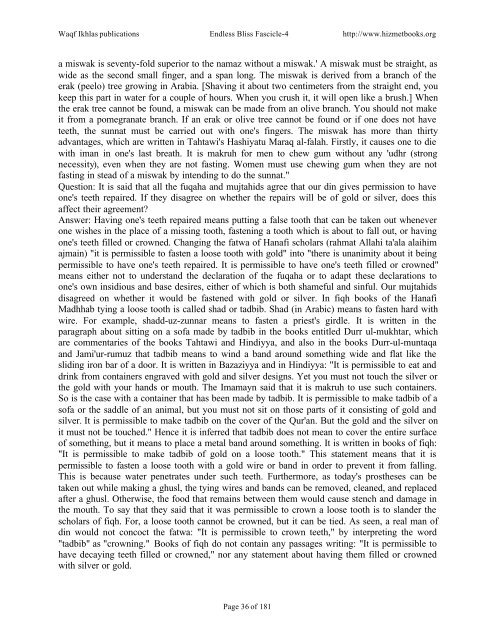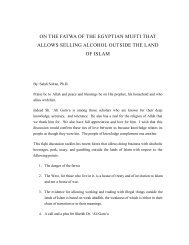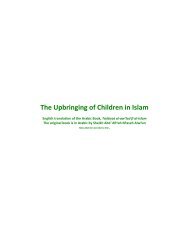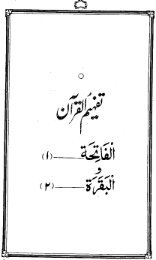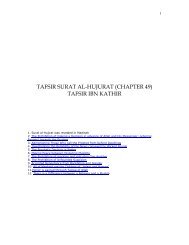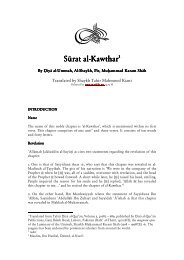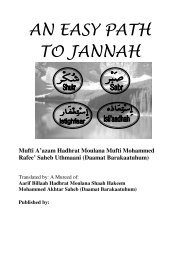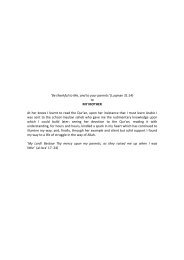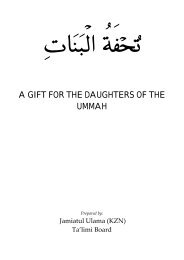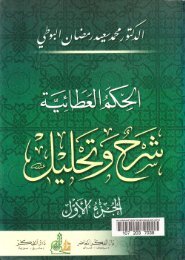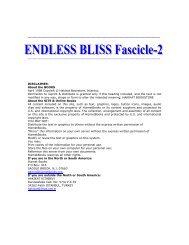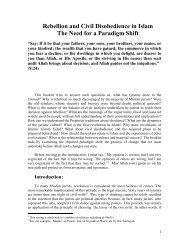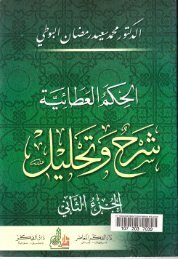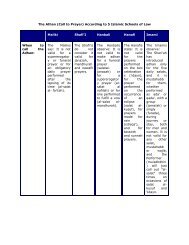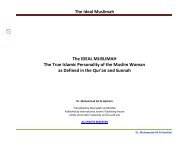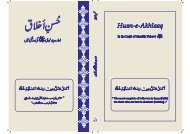ENDLESS BLISS FASCICLE-4
ENDLESS BLISS FASCICLE-4
ENDLESS BLISS FASCICLE-4
Create successful ePaper yourself
Turn your PDF publications into a flip-book with our unique Google optimized e-Paper software.
Waqf Ikhlas publications Endless Bliss Fascicle-4 http://www.hizmetbooks.org<br />
a miswak is seventy-fold superior to the namaz without a miswak.' A miswak must be straight, as<br />
wide as the second small finger, and a span long. The miswak is derived from a branch of the<br />
erak (peelo) tree growing in Arabia. [Shaving it about two centimeters from the straight end, you<br />
keep this part in water for a couple of hours. When you crush it, it will open like a brush.] When<br />
the erak tree cannot be found, a miswak can be made from an olive branch. You should not make<br />
it from a pomegranate branch. If an erak or olive tree cannot be found or if one does not have<br />
teeth, the sunnat must be carried out with one's fingers. The miswak has more than thirty<br />
advantages, which are written in Tahtawi's Hashiyatu Maraq al-falah. Firstly, it causes one to die<br />
with iman in one's last breath. It is makruh for men to chew gum without any 'udhr (strong<br />
necessity), even when they are not fasting. Women must use chewing gum when they are not<br />
fasting in stead of a miswak by intending to do the sunnat."<br />
Question: It is said that all the fuqaha and mujtahids agree that our din gives permission to have<br />
one's teeth repaired. If they disagree on whether the repairs will be of gold or silver, does this<br />
affect their agreement?<br />
Answer: Having one's teeth repaired means putting a false tooth that can be taken out whenever<br />
one wishes in the place of a missing tooth, fastening a tooth which is about to fall out, or having<br />
one's teeth filled or crowned. Changing the fatwa of Hanafi scholars (rahmat Allahi ta'ala alaihim<br />
ajmain) "it is permissible to fasten a loose tooth with gold" into "there is unanimity about it being<br />
permissible to have one's teeth repaired. It is permissible to have one's teeth filled or crowned"<br />
means either not to understand the declaration of the fuqaha or to adapt these declarations to<br />
one's own insidious and base desires, either of which is both shameful and sinful. Our mujtahids<br />
disagreed on whether it would be fastened with gold or silver. In fiqh books of the Hanafi<br />
Madhhab tying a loose tooth is called shad or tadbib. Shad (in Arabic) means to fasten hard with<br />
wire. For example, shadd-uz-zunnar means to fasten a priest's girdle. It is written in the<br />
paragraph about sitting on a sofa made by tadbib in the books entitled Durr ul-mukhtar, which<br />
are commentaries of the books Tahtawi and Hindiyya, and also in the books Durr-ul-muntaqa<br />
and Jami'ur-rumuz that tadbib means to wind a band around something wide and flat like the<br />
sliding iron bar of a door. It is written in Bazaziyya and in Hindiyya: "It is permissible to eat and<br />
drink from containers engraved with gold and silver designs. Yet you must not touch the silver or<br />
the gold with your hands or mouth. The Imamayn said that it is makruh to use such containers.<br />
So is the case with a container that has been made by tadbib. It is permissible to make tadbib of a<br />
sofa or the saddle of an animal, but you must not sit on those parts of it consisting of gold and<br />
silver. It is permissible to make tadbib on the cover of the Qur'an. But the gold and the silver on<br />
it must not be touched." Hence it is inferred that tadbib does not mean to cover the entire surface<br />
of something, but it means to place a metal band around something. It is written in books of fiqh:<br />
"It is permissible to make tadbib of gold on a loose tooth." This statement means that it is<br />
permissible to fasten a loose tooth with a gold wire or band in order to prevent it from falling.<br />
This is because water penetrates under such teeth. Furthermore, as today's prostheses can be<br />
taken out while making a ghusl, the tying wires and bands can be removed, cleaned, and replaced<br />
after a ghusl. Otherwise, the food that remains between them would cause stench and damage in<br />
the mouth. To say that they said that it was permissible to crown a loose tooth is to slander the<br />
scholars of fiqh. For, a loose tooth cannot be crowned, but it can be tied. As seen, a real man of<br />
din would not concoct the fatwa: "It is permissible to crown teeth," by interpreting the word<br />
"tadbib" as "crowning." Books of fiqh do not contain any passages writing: "It is permissible to<br />
have decaying teeth filled or crowned," nor any statement about having them filled or crowned<br />
with silver or gold.<br />
Page 36 of 181


